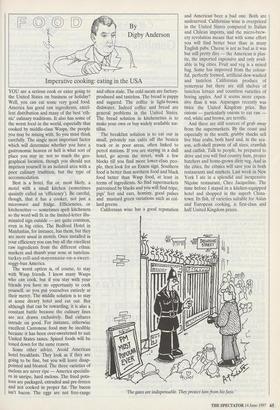Imperative cooking: eating in the USA
YOU are a serious cook or eater going to the United States on business or holiday? Well, you can eat some very good food. America has good raw ingredients, excel- lent distribution and many of the best `eth- nic' culinary traditions. It also has some of the worst food in the world, especially that cooked by middle-class Wasps, the people you may be mixing with. So you must think carefully. The single most important factor which will determine whether you have a gastronomic heaven or hell is what sort of place you stay in: not so much the geo- graphical location, though you should not imprison yourself in an isolated area with a poor culinary tradition, but the type of accommodation.
Best is a hotel, flat or, most likely, a motel with a small kitchen (sometimes quaintly called an `efficiency). Be careful, though, that it has a cooker, not just a microwave and fridge. Efficiencies, or kitchenettes — sometimes spelt kitchenets so the word will fit in the limited-letter illu- minated sign outside — are quite common, even in big cities. The Bedford Hotel in Manhattan, for instance, has them, but they are more usual in motels. Once installed in your efficiency you can buy all the excellent raw ingredients from the different ethnic markets and thumb your nose at tasteless- turkey-roll-and-mayonnaise-on-a-sweet- soggy-bun America.
The worst option is, of course, to stay with Wasp friends. I know many Wasps who can cook, but if you stay with your friends you have no opportunity to cook yourself, so you put yourselves entirely at their mercy. The middle solution is to stay at some dreary hotel and eat out. But although that can be rewarding, it is also a constant battle because the culinary lines are not drawn exclusively. Bad cultures intrude on good. For instance, otherwise excellent Cantonese food may be inedible because it has been over-sweetened to suit United States tastes. Spiced foods will be toned down for the same reason.
Some other advice. Avoid American hotel breakfasts. They look as if they are going to be fine, but you will leave disap- pointed and bloated. The three varieties of melons are never ripe — America specialis- es in unripe, hard melons. The fried pota- toes are packaged, extruded and pre-frozen and not cooked in proper fat. The bacon isn't bacon. The eggs are not free-range and often stale. The cold meats are factory- produced and tasteless. The bread is pappy and sugared. The coffee is light-brown dishwater. Indeed coffee and bread are general problems in the United States. The bread solution in kitchenettes is to make your own or buy widely available tor- tillas.
The breakfast solution is to eat out in small, privately run cafés off the beaten track or in poor areas, often linked to petrol stations. If you are staying in a dull hotel, go across the street, walk a few blocks till you find more lower-class peo- ple, then look for an Exxon sign. Southern food is better than northern food and black food better than Wasp food, at least in terms of ingredients. So find supermarkets patronised by blacks and you will find tripe, pigs' feet and ears, hominy, good pulses and mustard green variations such as col- lard greens.
Californian wine has a good reputation and American °beer a bad one. Both are undeserved. Californian wine is overpriced in the United States compared to Italian and Chilean imports, and the micro-brew- ery revolution means that with some effort you will find better beer than in many English pubs. Cheese is not as bad as it was but still pretty dire — the American is plas- tic, the imported expensive and only avail- able in big cities. Fruit and veg is a mixed bag. Some has improved from the colour- ful, perfectly formed, artificial-dew-washed and tasteless Californian produce of yesteryear but there are still shelves of tasteless lettuce and countless varieties of boring apples. And it seems more expen- sive than it was. Asparagus recently was twice the United Kingdom price. But onions — particularly onions to eat raw red, white and brown, are terrific.
And there are still sources of grub away from the supermarkets. By the coast and especially in the south, grubby shacks sell live blue crabs, both hard and, in the sea- son, soft-shell prawns of all sizes, crawfish and catfish. Talk to people, be prepared to drive and you will find country ham, proper butchers and home-grown dirty veg. And in the cities, the ethnics will save you in both restaurants and markets. Last week in New York I ate in a splendid and inexpensive Nicoise restaurant, Chez Jacqueline. The time before I stayed in a kitchen-equipped hotel and shopped in the superb China- town. Its fish, of varieties suitable for Asian and European cooking, is first-class and half United Kingdom prices.
`The gates are indispensable. They protect him from his fans.'










































































 Previous page
Previous page